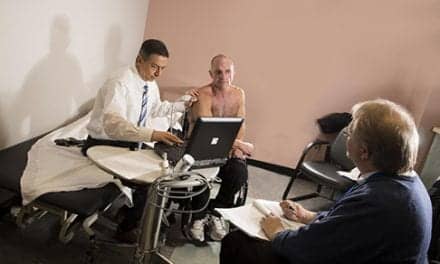A $7.8-million grant from the National Institute of Neurological Disorders and Stroke, one of the National Institutes of Health (NIH) is funding a collaboration between University of Louisville and Medtronic on an epidural stimulation project for people with spinal cord injury.
The work, which will take place at UofL’s Kentucky Spinal Cord Injury Research Center (KSCIRC) in collaboration with medical device manufacturer Medtronic, aims to develop and test software applications specifically designed for spinal cord injury that work in concert with Medtronic’s commercially available device, Intellis, which is indicated as a spinal cord stimulator for chronic pain.
The 5-year project, funded through the NIH BRAIN Initiative and led by Claudia Angeli, PhD, as well as Maxwell Boakye, MD, neurosurgeon and clinical director of KSCIRC, will focus on incorporating technology to improve control of locomotor and bladder function using epidural stimulation, according to a media release from University of Louisville.
“We have seen excellent results with epidural stimulation in the lab, but these enhancements to the technology system will make it much easier to implement this therapy out in the community. Integrating multiple systems will allow people with chronic spinal cord injuries to benefit from stimulation on a daily basis by reducing the need to monitor and manually revise stimulation settings.”
Claudia Angeli, PhD, Assistant Professor of Bioengineering, UofL J.B. Speed School of Engineering and Director, Epidural Stimulation Program at KSCIRC
Project Goal
Epidural stimulation therapy involves implanting a neurostimulator under the patients’ skin and implanting electrodes in the epidural space of the lower spinal cord, which together deliver mild electrical impulses to the spine.
While epidural stimulation has been proven to provide effective relief for chronic pain, there are limitations in functionality when treating individuals with spinal cord injury. For example, the stimulation settings that allow individuals with spinal cord injury to stand are different from settings that allow them to walk, while a third configuration is required to help with bladder function and so forth. The devices that researchers use today must be programmed manually for each individual function.
The goal of the new project is to develop integrated, closed-loop programming for multiple systems, specifically locomotion and bladder function, using wireless sensors to monitor the user’s condition and adjust stimulator settings as needed. Working with Medtronic, the UofL researchers will develop learning programs for the closed-loop system and integrate the programming with commercially available epidural stimulators, as an investigational use, the release explains.
“This device will be customized for the needs of individuals with spinal cord injury, which will require less manual interaction and lead to more positive outcomes in both locomotion and bladder function, dramatically improving the future of neuromodulation for spinal cord injury.”
— Maxwell Boakye, MD, chief of spinal neurosurgery at the UofL School of Medicine, neurosurgeon with UofL Health – UofL Physicians and lead neurosurgeon for implantation of the device
During the first phase of the study, the researchers will develop learning algorithms and the closed-loop system, working with the Medtronic’s Intellis Spinal Cord Stimulation (SCS) platform. This phase calls for eight individuals to receive implanted stimulators and either locomotor or bladder interventions to develop learning algorithms, which later will be integrated in closed-loop controls. Those data and technical tools then will be applied to a second group of eight individuals who have not received prior training.
“By monitoring multiple systems and enabling the controller to adjust stimulation without direct input from the user, these improvements will make this device a powerful tool for improving the lives of people with spinal cord injury.”
— April Herrity, PhD, an investigator on the project
“Medtronic is excited to be collaborating with the University of Louisville on research related to the use of spinal cord stimulation to improve function for individuals with spinal cord injury. Collaboration is vital to innovation in this space in order to meet the needs of this important patient population.”
— Charlie Covert, vice president and general manager of Pain Therapies, part of the Neuromodulation Operating Unit at Medtronic
[Source(s): University of Louisville, News-Medical Life Sciences]
Related Content:
SCI Patients Walk Over Ground and on Treadmill Using Implanted Stimulator
Spinal Cord-Injured Individual Regains Voluntary Motor Function, Researchers Report
Study Touts Epidural Stimulation as SCI Rehab Aid
Spinal Cord Stimulation Could Aid Movement and Function Even Years After Injury



![Patient Lifts: Balancing Safety with Recovery[Part Two of a Three-Part Series About Standing Systems, Lifts, and Body Weight Support Units]](https://rehabpub.com/wp-content/uploads/2012/03/2012-03_04-01.jpg)

